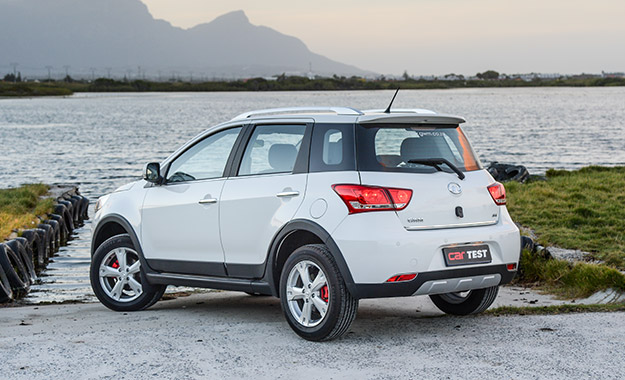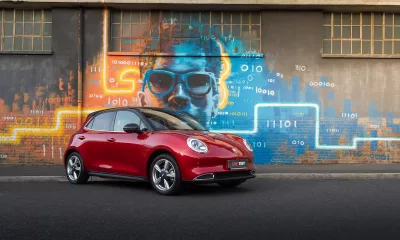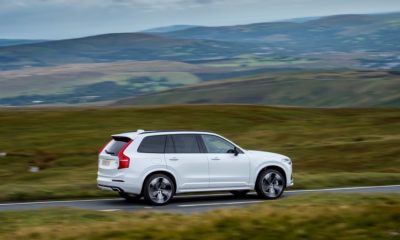UNTIL recently, the light SUV/crossover sub-segment featured but a handful of contenders. Within the space of a year, however, several small crossovers joined the fray and the list now includes Ford’s EcoSport, Renault’s Duster, VW’s CrossPolo, Renault’s Sandero Stepway and Suzuki’s SX4. The product proliferation is proof that small multi-use cars are gaining popularity and Great Wall Motors (GWM) is keen to claim a slice of the growing pie.
GWM is one of the more established Chinese brands in the local market. Just as is the case with the H6 large crossover, an example of which we tested in our March issue, the M4 (yes, it shares a name with BMW’s upcoming sporstscar – should we keep an eye out for a potential trademark court case?) is a riff on the crossover genre.
Replete with a slightly raised ride height, the exterior treatment features simple, clean lines and the European-inspired execution works well. There are no ungainly styling eccentricities and that gaping frontal maw gives it a distinctive appearance. We do, however, wish those faux bonnet air vents never left the parts bin.
An upright stance and plastic cladding on the lower body help to create the illusion of off-roading capability (GWM goes as far as calling it an SUV, but the crossover tag is apt).
Inside, too, the M4 creates a favourable impression. The cabin and facia layout is neat, with the monochrome black expanses highlighted by splashes of off-silver-coloured plastics. The seats are trimmed in durable-looking cloth with a textured finish.
The newcomer’s instrument cluster looks far more upmarket than that of its C20R sibling; it’s a digital speedo-meter flanked by LEDs for the heat and fuel gauges, even if the latter two readouts are particularly difficult to read in bright sunlight.
Taking pride of place atop the facia is an LCD display screen that shows information from the audio system in oversized blue characters and letters. Bluetooth telephony and music streaming work nicely in conjunction with the multifunction steering wheel, while the rear PDC is a boon when parking in tight spaces.
However, the snazzy looking “climate-control” system flatters to deceive; the HVAC’s central control knob and AC button looks as if it offers automatic climate control but it’s manually operated.
Even though the M4’s dimensions are similar to most of its rivals’, its interior feels comparatively cramped. Taller testers remarked that the driver’s chair didn’t slide back far enough and finding an ideal driving position was made harder because the seat height is fixed. Futhermore, the low steering column offers only tilt adjustment and some members of the test panel considered
the pedals set too high in the footwell.
Rear legroom is passable, although less competitive than the space afforded by the EcoSport and Duster. The Ford boasts 50 mm more legroom, in fact. We’d forgive the M4 if it countered with a capacious luggage compartment, but we measured a paltry 120 dm3 of volume. That figure is among the smallest capacities we’ve measured on “city cars” and that’s with a space-saver under the boot board.
Under the large bonnet lies the very same 1,5-litre engine that GWM employs in the C20R (as tested in the November 2013 issue and which runs in our long-term fleet). Considering the similar purposes and masses of the two vehicles, GWM didn’t bother endowing the M4 with more power, or indeed changing any of the gear ratios. The five-speed transmission is also shared with the M4’s sibling; it’s only a fractionally different tyre size that alters the overall gearing.
The inline four cylinder idles very low; so low, in fact, that some of us wondered if there is an auto stop/start system in operation. Lower down in the rev-range, operation is smooth, but the motor doesn’t have enough punch to keep engine speeds down. Instead, to make any sort of decent progress, you really have to lean on the loud pedal. That brings with it a few issues. One is the lack of sound-deadening between the cabin and engine, which leads to the second gripe: the strained nature of the engine at higher engine revolutions – it isn’t pleasant on the ear. And the third consequence is that the M4’s fuel consumption suffers if you need to keep up with traffic or drive hastily.
Our subjective impressions were confirmed against our VBOX test equipment. In the benchmark sprint test from standstill to 100 km/h, the M4 managed a best time of 13,34 seconds, and that was with plenty of revs applied for a brisk launch. The time is a few seconds off its rivals’ best. Perhaps the low mileage of the test unit is to blame.
Of more concern to us, however, is the poor braking performance. After repeated stops from 100 km/h, the calculated average was 3,84 seconds. This places the M4 among the likes of double-cab bakkies, which weigh twice as much, in the braking stakes. During the routine test, the anti-lock system wasn’t keen to intervene, mainly because the tyres weren’t generating enough grip against
the blacktop.
Dynamically, as per others in this class, you shouldn’t expect anything special. The M4 rides with a good level of pliancy. Under cornering, there is a degree of body roll and a tendency to gently understeer if really pushed. Unusual for a hydraulically assisted rack, the M4’s steering system requires constant inputs to keep it going in a straight line. There isn’t enough self-centring action and this can become quite tiresome, especially if your vehicle’s being blown around by a heavy Southeaster late in the Cape summer.
Test Summary
GWM has added an attention-grabbing newcomer to the light SUV/Crossover segment, but despite its eye-catching looks and impressive specification, the M4 doesn’t represent a fundamentally better purchasing proposition than its C20R sibling, which has fewer features but more luggage space (courtesy of a sliding rear bench) and costs R20 000 less.
By virtue of its kerbside appeal, the M4 is tailored to young urbanites who seek a wiedly urban runabout with a plethora of creature comforts, such as Bluetooth connectivity.
However, the GWM is let down by its cramped packaging and compromised dynamics. If practicality is high on your priority list, you may want to spend R190 000 elsewhere.












